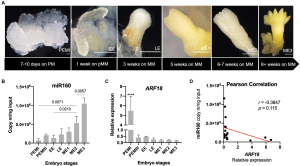
Alves A, Confraria A, Lopes S, Costa B, Perdiguero P, Milhinhos A, Baena-González E, Correia S, Miguel CM.
MicroRNAs (miRNAs) are key regulators of several plant developmental processes including embryogenesis. Most miRNA families are conserved across major groups of plant species, but their regulatory roles have been studied mainly in model species like Arabidopsis and other angiosperms. In gymnosperms, miRNA-dependent regulation has been less studied since functional approaches in these species are often difficult to establish. Given the fundamental roles of auxin signaling in somatic embryogenesis (SE) induction and embryo development, we investigated a previously predicted interaction between miR160 and a putative target encoding AUXIN RESPONSE FACTOR 18 in Pinus pinaster (PpARF18) embryonic tissues. Phylogenetic analysis of AUXIN RESPONSE FACTOR 18 (ARF18) from Pinus pinaster and Picea abies, used here as a model system of conifer embryogenesis, showed their close relatedness to AUXIN RESPONSE FACTOR (ARF) genes known to be targeted by miR160 in other species, including Arabidopsis ARF10 and ARF16. By using a luciferase (LUC) reporter system for miRNA activity in Arabidopsis protoplasts, we have confirmed that P. pinaster miR160 (ppi-miR160) interacts in vivo with PpARF18 target site. When the primary miR160 from P. pinaster was overexpressed in protoplasts under non-limiting levels of ARGONAUTE1, a significant increase of miR160 target cleavage activity was observed. In contrast, co-expression of the primary miRNA and the target mimic MIM160 led to a decrease of miR160 activity. Our results further support that this interaction is functional during consecutive stages of SE in the conifer model P. abies. Expression analyses conducted in five stages of development, from proembryogenic masses (PEMs) to the mature embryo, show that conifer ARF18 is negatively regulated by miR160 toward the fully developed mature embryo when miR160 reached its highest expression level. This study reports the first in vivo validation of a predicted target site of a conifer miRNA supporting the conservation of miR160 interaction with ARF targets in gymnosperms. The approach used here should be useful for future characterization of miRNA functions in conifer embryogenesis.
Cited as: Alves A, Confraria A, Lopes S, Costa B, Perdiguero P, Milhinhos A, Baena-González E, Correia S, Miguel CM (2022) miR160 Interacts in vivo With Pinus pinaster AUXIN RESPONSE FACTOR 18 Target Site and Negatively Regulates Its Expression During Conifer Somatic Embryo Development. FRONTIERS IN PLANT SCIENCE, 13, 857611. doi: https://doi.org/10.3389/fpls.2022.857611



